Gairdner J. History of the Life and Reign of Richard the Third: To which is Added the Story of Perkin Warbeck from Original Documents
Подождите немного. Документ загружается.

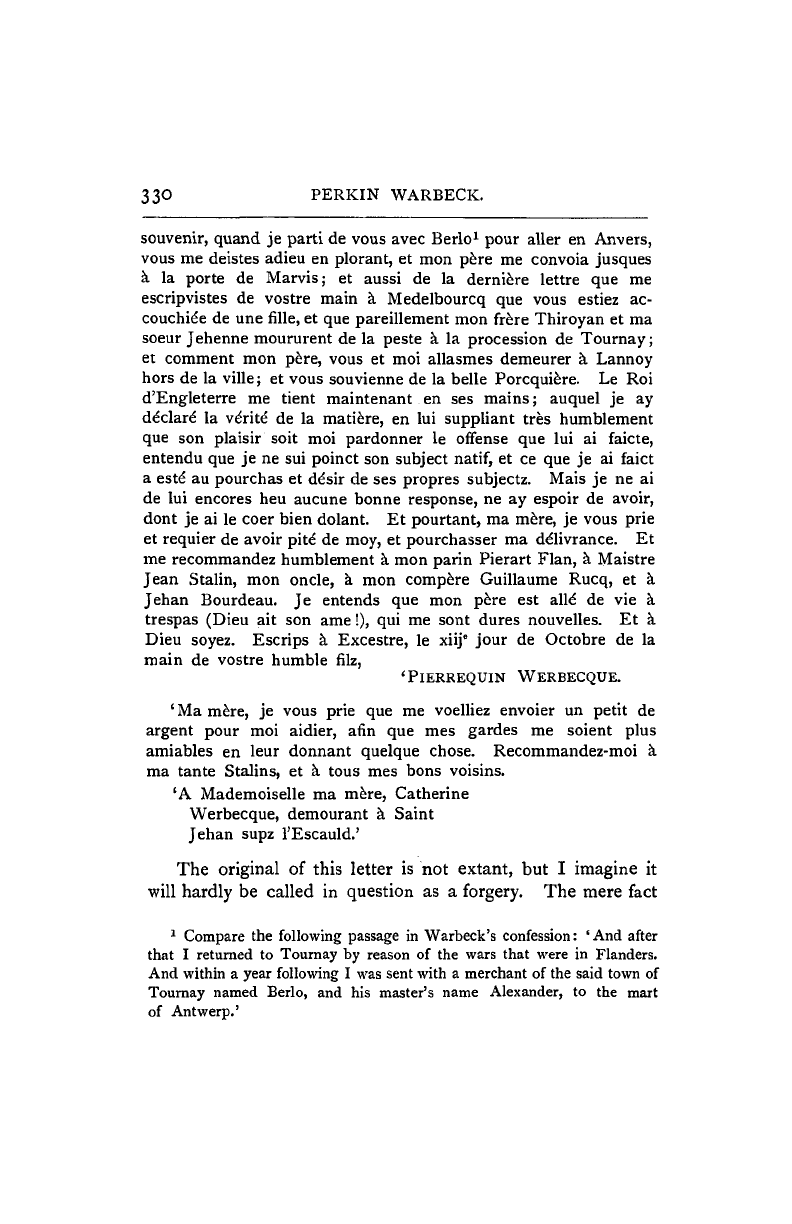
33O PERKIN WARBECK.
souvenir, quand je parti de vous avec Berlo
1
pour aller en Anvers,
vous me deistes adieu en plorant, et mon pere me convoia jusques
a la porte de Marvis; et aussi de la derniere lettre que me
escripvistes de vostre main a Medelbourcq que vous estiez ac-
couchie'e de une fille, et que pareillement mon frere Thiroyan et ma
soeur Jehenne moururent de la peste a la procession de Tournay;
et comment mon pere, vous et moi allasmes demeurer a Lannoy
hors de la ville; et vous souvienne de la belle Porcquiere. Le Roi
d'Engleterre me tient maintenant en ses mains; auquel je ay
declare' la ve'rite' de la matiere, en lui suppliant tres humblement
que son plaisir soit moi pardonner le offense que lui ai faicte,
entendu que je ne sui poinct son subject
natif,
et ce que je ai faict
a este" au pourchas et de'sir de ses propres subjectz. Mais je ne ai
de lui encores heu aucune bonne response, ne ay espoir de avoir,
dont je ai le coer bien dolant. Et pourtant, ma mere, je vous prie
et requier de avoir pits' de moy, et pourchasser ma delivrance. Et
me recommandez humblement a mon parin Pierart Flan, a Maistre
Jean Stalin, mon oncle, a. mon compere Guillaume Rucq, et a
Jehan Bourdeau. Je entends que mon pere est alle" de vie a
trespas (Dieu ait son ame!), qui me sont dures nouvelles. Et a
Dieu soyez. Escrips a Excestre, le
xiij'
jour de Octobre de la
main de vostre humble filz,
'PlERREQUIN WERBECQUE.
' Ma mere, je vous prie que me voelliez envoier un petit de
argent pour moi aidier, afin que mes gardes me soient plus
amiables en leur donnant quelque chose. Recommandez-moi a
ma tante Stalins, et a tous mes bons voisins.
'A Mademoiselle ma mere, Catherine
Werbecque, demourant a Saint
Jehan supz
1'Escauld.'
The original of this letter is not extant, but I imagine it
will hardly be called in question as a forgery. The mere fact
1
Compare the following passage in Warbeck's confession: 'And after
that I returned to Tournay by reason of the wars that were in Flanders.
And within a year following I was sent with a merchant of the said town of
Tournay named Berlo, and his master's name Alexander, to the mart
of Antwerp.'
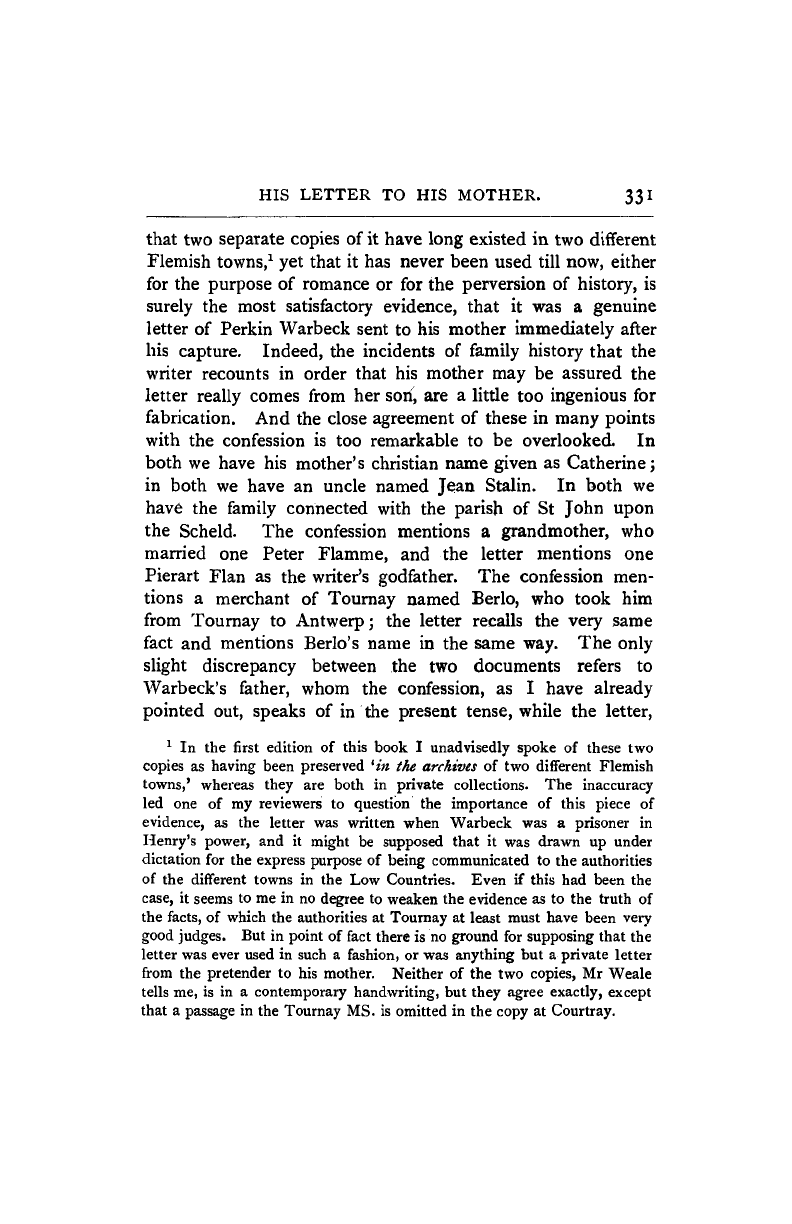
HIS LETTER TO HIS MOTHER. 331
that two separate copies of it have long existed in two different
Flemish towns,
1
yet that it has never been used till now, either
for the purpose of romance or for the perversion of history, is
surely the most satisfactory evidence, that it was a genuine
letter of Perkin Warbeck sent to his mother immediately after
his capture. Indeed, the incidents of family history that the
writer recounts in order that his mother may be assured the
letter really comes from her sori, are a little too ingenious for
fabrication. And the close agreement of these in many points
with the confession is too remarkable to be overlooked. In
both we have his mother's Christian name given as Catherine;
in both we have an uncle named Jean Stalin. In both we
have the family connected with the parish of St John upon
the Scheld. The confession mentions a grandmother, who
married one Peter Flamme, and the letter mentions one
Pierart Flan as the writer's godfather. The confession men-
tions a merchant of Tournay named Berlo, who took him
from Tournay to Antwerp; the letter recalls the very same
fact and mentions Berlo's name in the same way. The only
slight discrepancy between the two documents refers to
Warbeck's father, whom the confession, as I have already
pointed out, speaks of in the present tense, while the letter,
1
In the first edition of this book I unadvisedly spoke of these two
copies as having been preserved 'in the archives of two different Flemish
towns,' whereas they are both in private collections. The inaccuracy
led one of my reviewers to question the importance of this piece of
evidence, as the letter was written when Warbeck was a prisoner in
Henry's power, and it might be supposed that it was drawn up under
dictation for the express purpose of being communicated to the authorities
of the different towns in the Low Countries. Even if this had been the
case,
it seems to me in no degree to weaken the evidence as to the truth of
the facts, of which the authorities at Tournay at least must have been very
good judges. But in point of fact there is no ground for supposing that the
letter was ever used in such a fashion, or was anything but a private letter
from the pretender to his mother. Neither of the two copies, Mr Weale
tells me, is in a contemporary handwriting, but they agree exactly, except
that a passage in the Tournay MS. is omitted in the copy at Courtray.
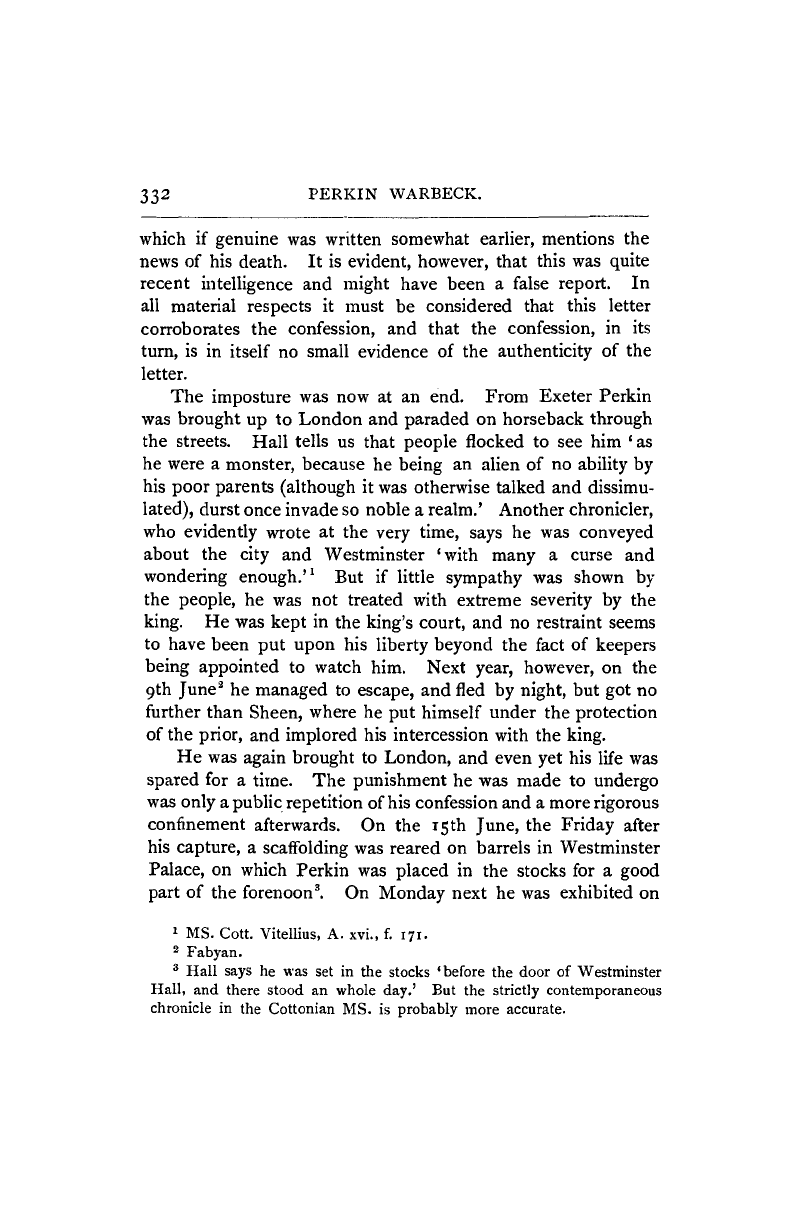
332 PERKIN WARBECK.
which if genuine was written somewhat earlier, mentions the
news of his death. It is evident, however, that this was quite
recent intelligence and might have been a false report. In
all material respects it must be considered that this letter
corroborates the confession, and that the confession, in its
turn, is in itself no small evidence of the authenticity of the
letter.
The imposture was now at an end. From Exeter Perkin
was brought up to London and paraded on horseback through
the streets. Hall tells us that people flocked to see him 'as
he were a monster, because he being an alien of no ability by
his poor parents (although it was otherwise talked and dissimu-
lated),
durst once invade so noble a realm.' Another chronicler,
who evidently wrote at the very time, says he was conveyed
about the city and Westminster 'with many a curse and
wondering enough." But if little sympathy was shown by
the people, he was not treated with extreme severity by the
king. He was kept in the king's court, and no restraint seems
to have been put upon his liberty beyond the fact of keepers
being appointed to watch him. Next year, however, on the
9th June
2
he managed to escape, and fled by night, but got no
further than Sheen, where he put himself under the protection
of the prior, and implored his intercession with the king.
He was again brought to London, and even yet his life was
spared for a time. The punishment he was made to undergo
was only a public repetition of
his
confession and a more rigorous
confinement afterwards. On the 15th June, the Friday after
his capture, a scaffolding was reared on barrels in Westminster
Palace, on which Perkin was placed in the stocks for a good
part of the forenoon
3
. On Monday next he was exhibited on
1
MS. Cott. Vitellius, A. xvi., f. 171.
2
Fabyan.
3
Hall says he was set in the stocks 'before the door of Westminster
Hall, and there stood an whole day.' But the strictly contemporaneous
chronicle in the Cottonian MS. is probably more accurate.
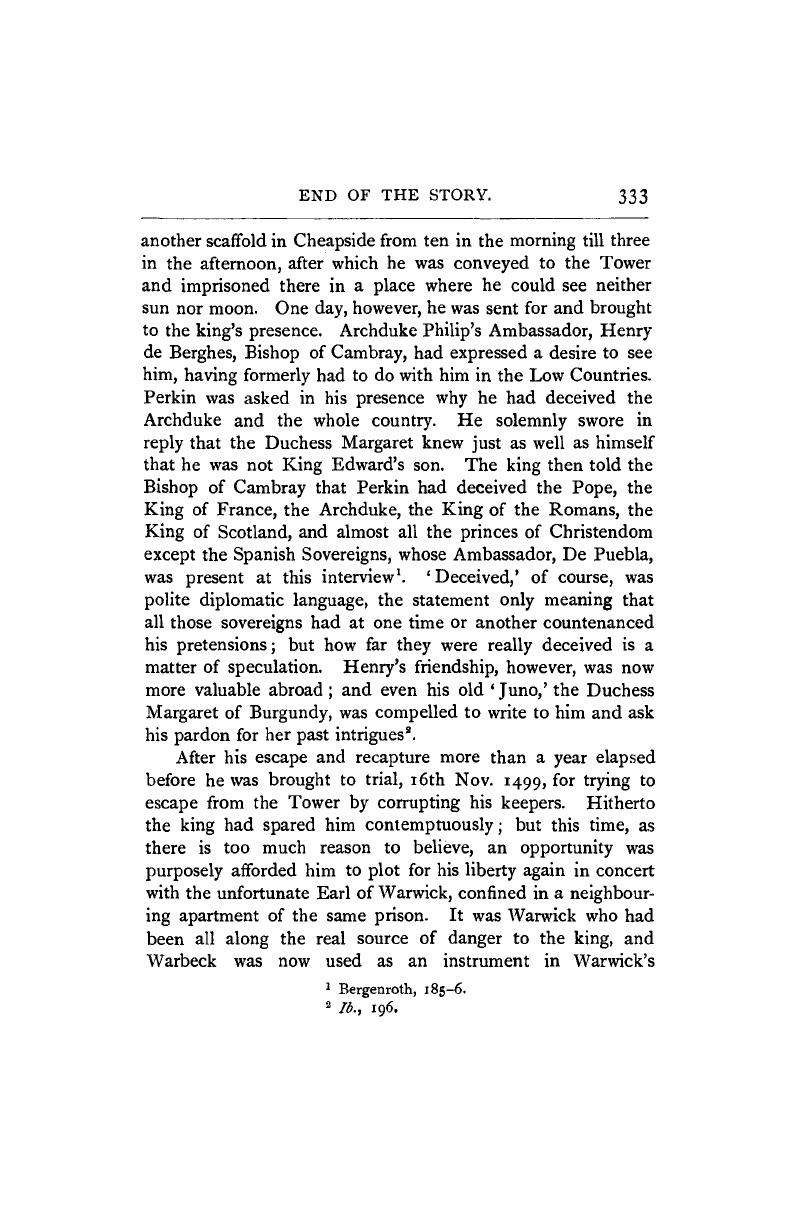
END OF THE STORY. 333
another scaffold in Cheapside from ten in the morning till three
in the afternoon, after which he was conveyed to the Tower
and imprisoned there in a place where he could see neither
sun nor moon. One day, however, he was sent for and brought
to the king's presence. Archduke Philip's Ambassador, Henry
de Berghes, Bishop of Cambray, had expressed a desire to see
him, having formerly had to do with him in the Low Countries.
Perkin was asked in his presence why he had deceived the
Archduke and the whole country. He solemnly swore in
reply that the Duchess Margaret knew just as well as himself
that he was not King Edward's son. The king then told the
Bishop of Cambray that Perkin had deceived the Pope, the
King of France, the Archduke, the King of the Romans, the
King of Scotland, and almost all the princes of Christendom
except the Spanish Sovereigns, whose Ambassador, De Puebla,
was present at this interview
1
. 'Deceived,' of course, was
polite diplomatic language, the statement only meaning that
all those sovereigns had at one time or another countenanced
his pretensions; but how far they were really deceived is a
matter of speculation. Henry's friendship, however, was now
more valuable abroad; and even his old ' Juno,' the Duchess
Margaret of Burgundy, was compelled to write to him and ask
his pardon for her past intrigues".
After his escape and recapture more than a year elapsed
before he was brought to trial, 16th Nov. 1499, for trying to
escape from the Tower by corrupting his keepers. Hitherto
the king had spared him contemptuously; but this time, as
there is too much reason to believe, an opportunity was
purposely afforded him to plot for his liberty again in concert
with the unfortunate Earl of Warwick, confined in a neighbour-
ing apartment of the same prison. It was Warwick who had
been all along the real source of danger to the king, and
Warbeck was now used as an instrument in Warwick's
1
Bergenroth, 185-6.
2
lb., 196.
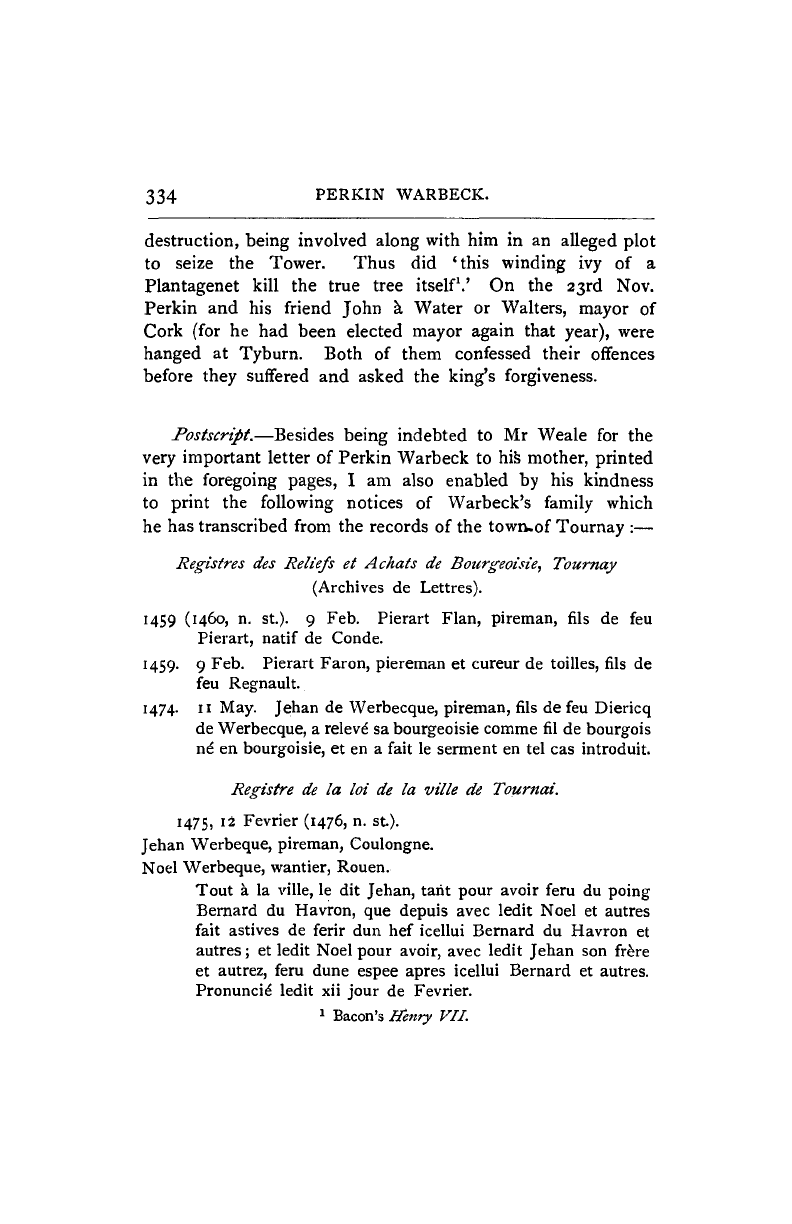
334 PERKIN WARBECK.
destruction, being involved along with him in an alleged plot
to seize the Tower. Thus did 'this winding ivy of a
Plantagenet kill the true tree
itself
1
.'
On the 23rd Nov.
Perkin and his friend John a Water or Walters, mayor of
Cork (for he had been elected mayor again that year), were
hanged at Tyburn. Both of them confessed their offences
before they suffered and asked the king's forgiveness.
Postscript.—Besides being indebted to Mr Weale for the
very important letter of Perkin Warbeck to his mother, printed
in the foregoing pages, I am also enabled by his kindness
to print the following notices of Warbeck's family which
he has transcribed from the records of the town-of Tournay :—
Registres des Reliefs et A chats de Bourgeoisie, Tournay
(Archives de Lettres).
1459 (1460, n. St.). 9 Feb. Pierart Flan, pireman, fils de feu
Pierart, natif de Conde.
1459.
9 Feb. Pierart Faron, piereman et cureur de toilles, fils de
feu Regnault.
1474.
11 May. Jehan de Werbecque, pireman, fils de feu Diericq
de Werbecque, a
releve"
sa bourgeoisie comme fil de bourgois
n€ en bourgoisie, et en a fait le serment en tel cas introduit.
Registre de la lot de la ville de Tournai.
1475,
12 Fevrier (1476, n. St.).
Jehan Werbeque, pireman, Coulongne.
Noel Werbeque, wantier, Rouen.
Tout a la ville, le dit Jehan, tarit pour avoir feru du poing
Bernard du Havron, que depuis avec ledit Noel et autres
fait astives de ferir dun hef icellui Bernard du Havron et
autres ; et ledit Noel pour avoir, avec ledit Jehan son frere
et autrez, feru dune espee apres icellui Bernard et autres.
Pronuncie* ledit xii jour de Fevrier.
1
Bacon's Henry VII.
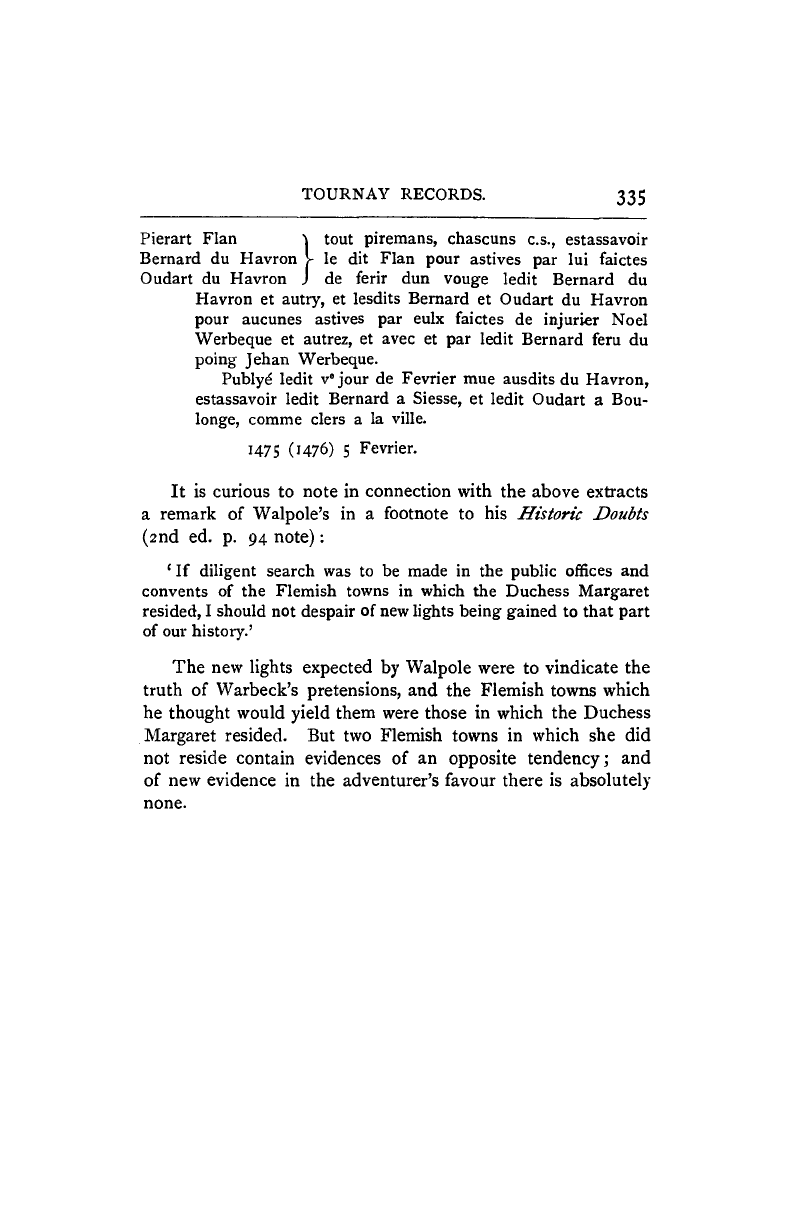
TOURNAY RECORDS. 335
Pierart Flan \ tout piremans, chascuns c.s., estassavoir
Bernard du Havron
V
le dit Flan pour astives par lui faictes
Oudart du Havron J de ferir dun vouge ledit Bernard du
Havron et autry, et lesdits Bernard et Oudart du Havron
pour aucunes astives par eulx faictes de injurier Noel
Werbeque et autrez, et avec et par ledit Bernard feru du
poing Jehan Werbeque.
Publye" ledit v' jour de Fevrier mue ausdits du Havron,
estassavoir ledit Bernard a Siesse, et ledit Oudart a Bou-
longe, comme clers a la ville.
1475 (H76) 5 Fevrier.
It is curious to note in connection with the above extracts
a remark of Walpole's in a footnote to his Historic Doubts
(2nd ed. p. 94 note):
'If diligent search was to be made in the public offices and
convents of the Flemish towns in which the Duchess Margaret
resided, I should not despair of
new
lights being gained to that part
of our history.'
The new lights expected by Walpole were to vindicate the
truth of Warbeck's pretensions, and the Flemish towns which
he thought would yield them were those in which the Duchess
Margaret resided. But two Flemish towns in which she did
not reside contain evidences of an opposite tendency; and
of new evidence in the adventurer's favour there is absolutely
none.

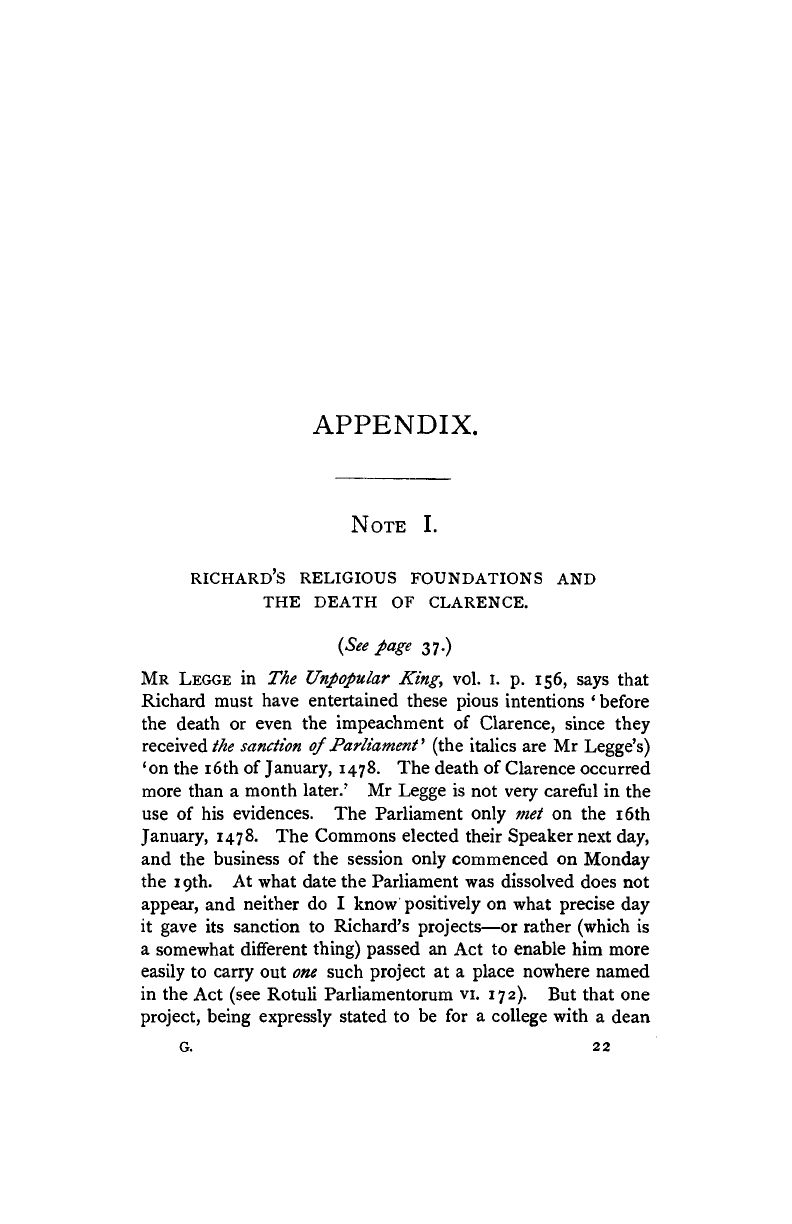
APPENDIX.
NOTE
I.
RICHARD'S
RELIGIOUS FOUNDATIONS AND
THE
DEATH OF
CLARENCE.
(See
page 37.)
MR
LEGGE in The Unpopular King, vol. 1. p. 156, says that
Richard must have entertained these pious intentions ' before
the death or even the impeachment of Clarence, since they
received/$£
sanction
of Parliament' (the italics are Mr Legge's)
'on the 16th of January, 1478. The death of Clarence occurred
more than a month later.' Mr Legge is not very careful in the
use of his evidences. The Parliament only met on the 16th
January, 1478. The Commons elected their Speaker next day,
and the business of the session only commenced on Monday
the 19th. At what date the Parliament was dissolved does not
appear, and neither do I know positively on what precise day
it gave its sanction to Richard's projects—or rather (which is
a somewhat different thing) passed an Act to enable him more
easily to carry out
one
such project at a place nowhere named
in the Act (see Rotuli Parliamentorum vi. 172). But that one
project, being expressly stated to be for a college with a dean
G.
22
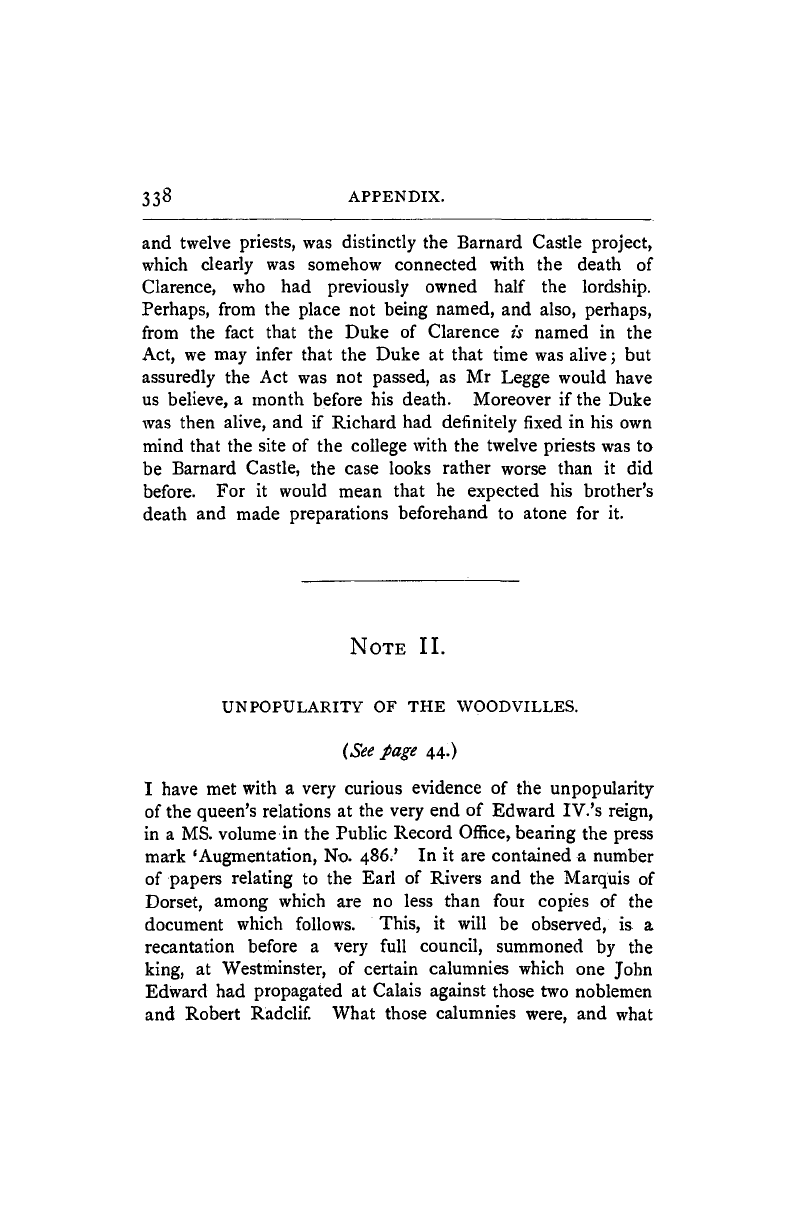
338 APPENDIX.
and twelve priests, was distinctly the Barnard Castle project,
which clearly was somehow connected with the death of
Clarence, who had previously owned half the lordship.
Perhaps, from the place not being named, and also, perhaps,
from the fact that the Duke of Clarence is named in the
Act, we may infer that the Duke at that time was alive; but
assuredly the Act was not passed, as Mr Legge would have
us believe, a month before his death. Moreover if the Duke
was then alive, and if Richard had definitely fixed in his own
mind that the site of the college with the twelve priests was to
be Barnard Castle, the case looks rather worse than it did
before. For it would mean that he expected his brother's
death and made preparations beforehand to atone for it.
NOTE II.
UNPOPULARITY OF THE WOODVILLES.
(See
page 44.)
I have met with a very curious evidence of the unpopularity
of the queen's relations at the very end of Edward IV.'s reign,
in a MS. volume in the Public Record Office, bearing the press
maik 'Augmentation, No. 486/ In it are contained a number
of papers relating to the Earl of Rivers and the Marquis of
Dorset, among which are no less than four copies of the
document which follows. This, it will be observed, is a
recantation before a very full council, summoned by the
king, at Westminster, of certain calumnies which one John
Edward had propagated at Calais against those two noblemen
and Robert
Radclif.
What those calumnies were, and what
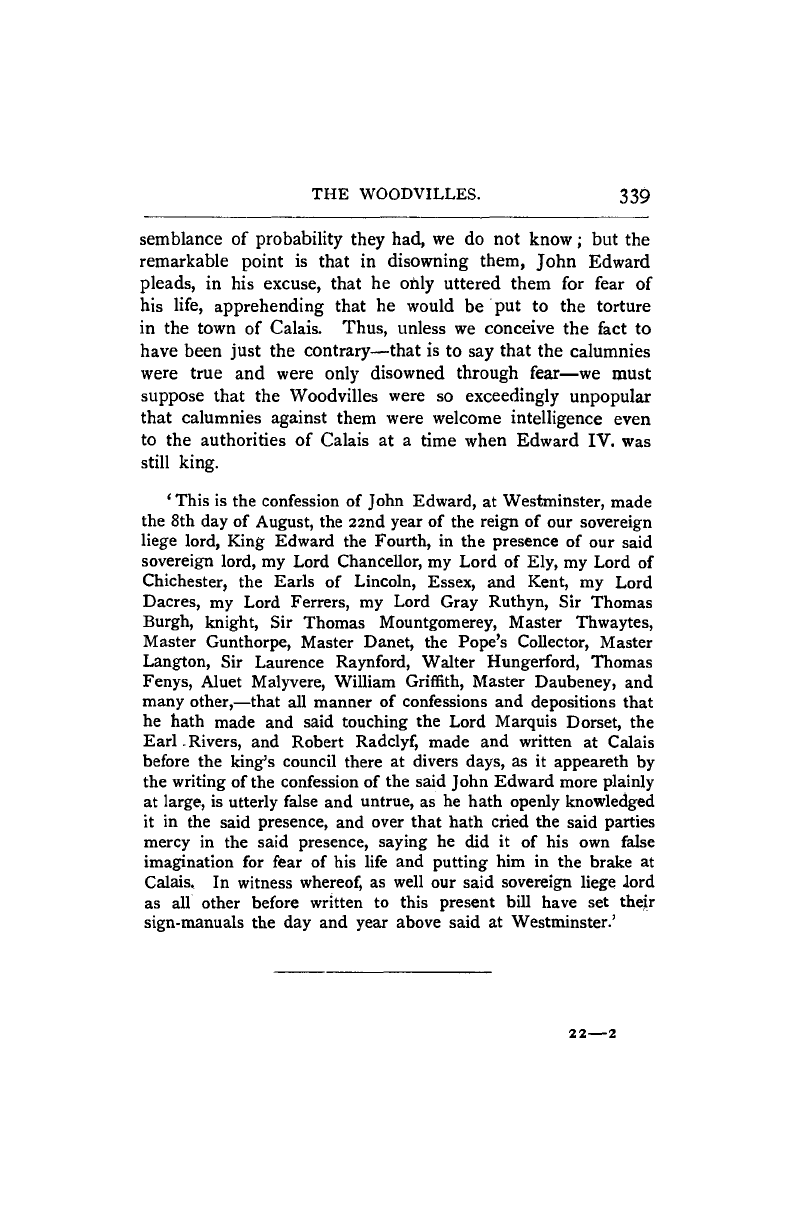
THE WOODVILLES. 339
semblance of probability they had, we do not know; but the
remarkable point is that in disowning them, John Edward
pleads, in his excuse, that he only uttered them for fear of
his life, apprehending that he would be put to the torture
in the town of Calais. Thus, unless we conceive the fact to
have been just the contrary—that is to say that the calumnies
were true and were only disowned through fear—we must
suppose that the Woodvilles were so exceedingly unpopular
that calumnies against them were welcome intelligence even
to the authorities of Calais at a time when Edward IV. was
still king.
' This is the confession of John Edward, at Westminster, made
the 8th day of August, the 22nd year of the reign of our sovereign
liege lord, King Edward the Fourth, in the presence of our said
sovereign lord, my Lord Chancellor, my Lord of Ely, my Lord of
Chichester, the Earls of Lincoln, Essex, and Kent, my Lord
Dacres, my Lord Ferrers, my Lord Gray Ruthyn, Sir Thomas
Burgh, knight, Sir Thomas Mountgomerey, Master Thwaytes,
Master Gunthorpe, Master Danet, the Pope's Collector, Master
Langton, Sir Laurence Raynford, Walter Hungerford, Thomas
Fenys, Aluet Malyvere, William Griffith, Master Daubeney, and
many other,—that all manner of confessions and depositions that
he hath made and said touching the Lord Marquis Dorset, the
Earl .Rivers, and Robert
Radclyf,
made and written at Calais
before the king's council there at divers days, as it appeareth by
the writing of the confession of the said John Edward more plainly
at large, is utterly false and untrue, as he hath openly knowledged
it in the said presence, and over that hath cried the said parties
mercy in the said presence, saying he did it of his own false
imagination for fear of his life and putting him in the brake at
Calais, In witness
whereof,
as well our said sovereign liege lord
as all other before written to this present bill have set their
sign-manuals the day and year above said at Westminster.'
22—2
